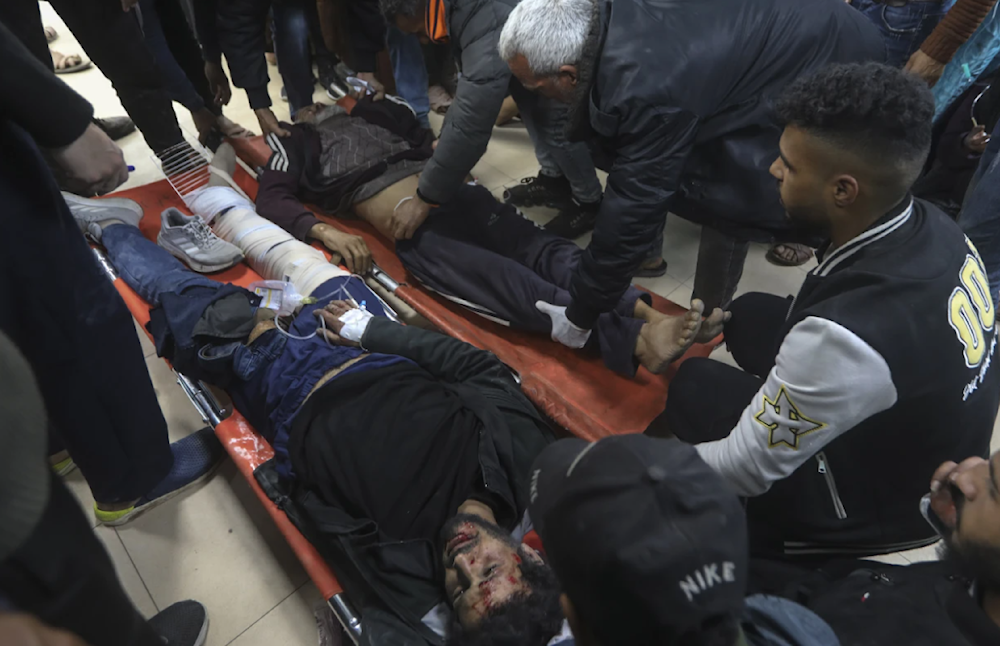Health facilities in southern Gaza Strip at breaking point, ICRC warns
The director of the ICRC's sub-delegation in Gaza confirmed that the large number of casualties had pushed the organization's hospital and all health facilities in southern Gaza to the brink of collapse.
-

Palestinians wounded in Israeli strikes are brought to al-Aqsa hospital in Deir al-Balah on March 25, 2024. (AP)
The International Committee of the Red Cross (ICRC) has announced that all healthcare facilities in southern Gaza have reached their breaking point as a result of the continued Israeli aggression.
William Schomburg, the director of the International Committee of the Red Cross's sub-delegation in Gaza, confirmed that the large number of casualties had pushed the ICRC's hospital and all health facilities in southern Gaza to the brink of collapse, rendering them unable to treat those with critical injuries.
According to the organization, its field hospital in Rafah only has 60 beds. Schomburg said that the IOF's bombing of al-Mawasi last Saturday resulted in 26 wounded Palestinians entering the ICRC hospital, including children hurt by shrapnel.
Israeli strikes on al-Mawasi, Khan Younis, in the southern Gaza Strip killed at least 90 Palestinians and injured hundreds of others, adding yet another heinous crime to "Israel's" record.
The committee emphasized that any further assault that results in such a significant number of victims would require physicians and nurses to make tough decisions, emphasizing that civilians' existing medical demands considerably outweigh the limited skills available.
On his part, Dr. Pankaj Jhaldiyal, an Emergency Physician Specialist at the International Committee of the Red Cross, stated, "It is unimaginable how many patients needed resuscitation after the influx of injured people on Saturday, in addition to the 26 wounded who were transferred from al-Mawasi to the Red Cross field hospital to receive treatment."
"The facility received an additional 850 people in its outpatient department last week, about half of whom were women and a third of whom were children," Schomburg stated.
The ICRC found that the majority of the patients have been evicted from their homes many times and live in congested locations with inadequate access to food and water, making them more susceptible to disease transmission.
Schomburg said that since the facility's launch in May, its personnel had performed 12,000 medical consultations and over 500 surgical procedures.
Humanitarian crisis in Gaza worsens amid ongoing Israeli aggression
Al Mayadeen's correspondent highlighted the severe water crisis in Deir al-Balah, noting that the area's last remaining wells have ceased operations due to fuel shortage. He pointed out that hunger has driven some people to eat grass and leaves, causing several cases of poisoning.
On their end, Doctors Without Borders confirmed that with each attack, medical teams in Gaza face immense pressures, exacerbated by a strained health system. The organization emphasized that hospitals in Gaza are lacking even the most basic necessities, which could result in more civilian casualties.
The intense smell of sewage, which is becoming more and more of a hazard, coupled with the ongoing genocide, is an unfortunate everyday occurrence in Umm Nahed Abu Shar's tent in a Gaza camp at every meal.
The Gaza Strip is "drowning" in hundreds of thousands of tons of uncollected human waste and debris from the war on Gaza, according to a report released on Thursday by a European activist group. This situation might quickly extend to the neighboring region.
In the central Gazan city of Deir el-Balah, where authorities announced this week that wastewater treatment plants had gone offline because of the lack of fuel, Abu Shar and her family are experiencing a nightmare in their tent amid rising summer temperatures.
"We are just suffering; we are not living," Abu Shar told AFP, adding, "The heat, the diseases, the flies, the mosquitoes and their hissing, it all hurts us."

 4 Min Read
4 Min Read








